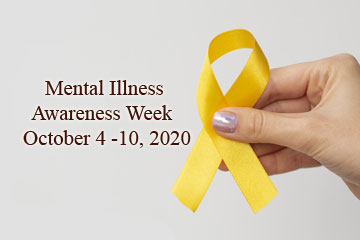
Mental illnesses are health conditions that involve changes in behavior, thinking, or emotion. Mental illness can be a combination of these. According to psychiatry.org, 19% of U.S. adults experience some form of mental illness. 4.1% has a severe mental illness, and 8.5% has a diagnosable substance use disorder. Mental illness is nothing to be ashamed of and there are effective treatments to help people manage their condition.
The U.S. Congress established Mental Health Awareness Week (MIAW) in 1990 to recognize efforts by the National Alliance on Mental Illness (NAMI) to educate the public, fight stigma and provide support. MIAW 2020 takes place from October 4 to October 10. This year, the theme is “What People with Mental Illness Want You to Know.”
Setting aside time to focus on mental health conditions during this week allows mental health advocates across the country to unite as one voice. The year-long “You Are Not Alone” campaign will present stories of people affected by mental illness to fight stigma, educate public, provide support, and show that no one is ever really alone.
This year, the COVID-19 pandemic has brought on new challenges and is proving stressful for many people. Social distancing can increase stress and anxiety as it isolates people and makes them feel lonely. People tend to worry about their health and that of their loved ones and their job. Disease outbreaks like COVID-19 can cause change in sleeping patterns, increased dependence on alcohol and other substances, and worsen mental health conditions.
As a result of this, it is expected that the need for mental health and psychological support will increase significantly in the coming days, months, and years. So, investment in national and international level mental health programs that have already suffered from years of underfunding is more important than ever it has been. This is why the World Federation for Mental Health (WFMH) decide to launch the World Mental Health Day Campaign with the theme “Mental Health For All, Greater Investment-Greater Access.”
World Mental Health Day was first celebrated on October 10, 1992, at the World Federation for Mental Health (WFMH) initiative. It is an international day for worldwide mental health education, awareness, and support against social stigma. Each year on this day, thousands of people join to celebrate this awareness program to bring attention to mental illness and its critical effects on people’s lives globally. This year, WFMH calls for the urgent redress and investment in mental health. Greater investment is needed now more than ever to make sure that everyone, everywhere has access to mental health care.
Here are six ways that can prevent mental illness:
- Screening: To know whether you are experiencing a mental illness, the first thing you should do is to recognize it. Taking a mental health screening is one of the fastest and simplest ways to identify the problem. Screening is a helpful tool to help you begin a conversation with your doctor or to your loved ones about mental health.
- Take care of yourself: Take good care of yourself by having nutritious food, meditation, exercise, practicing good sleeping habits and listening to your body’s needs.
- Stay positive: Research shows that how you think about yourself can have a powerful effect on how you feel. Staying positive will motivate you and reduce the risk of developing depression and anxiety. Try to focus on good things and spend less time thinking of bad things.
- Exercise: Exercise is a powerful medicine to stress, anxiety, depression, and helps you sleep better by improving cognitive function and self-esteem. It boosts overall mood. Outdoor exercise allows exposure to sunlight that helps your body produce vitamin D. The time you spend with nature during your exercise reduces your stress and helps you stay pleasant.
- Take breaks and deal with stress: Taking a break between the things you do will increase your productivity and creativity. If you feel overwhelmed with work, doing breathing exercises can help you relax. This will refreshes the mind and promote creativity.
- Get help: If you feel like you need help, ask for it without delay. Mental health conditions can become worse if you wait until your symptoms get bad.
Get involved – ensure that no one who needs help is left behind!
